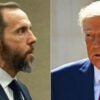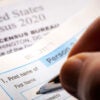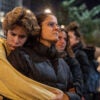In April of this year, when a student in Turkey asked President Obama how he was different from President Bush, Obama said,
“When it comes to climate change, George Bush didn’t believe in climate change. I do believe in climate change, I think it’s important.”
In this response, Obama is pointing to a crucial facet in the rhetoric surrounding the climate change debate, which is the rift between those who believe that climate change is a crisis and those who believe that climate change is not a crisis; between those who believe that many of the problems of the world are due to climate change and those who believe that those same problems would not have been prevented by a few degrees of global cooling.
In England, this belief in climate change is now of the same legal standing as a religious belief. Just this month, Tim Nicholson was told that he will be able to take his employer to tribunal on the grounds that he was unfairly dismissed from his job because of his belief on climate change. This decision comes under the UK’s Employment Equality (Religion and Belief) Regulations of 2003 which protects employees for “any religion, religious belief, or philosophical belief.” After the verdict, Nicholson said
“I believe man-made climate change is the most important issue of our time and nothing should stand in the way of diverting this catastrophe. This philosophical belief that is based on scientific evidence has now been given the same protection in law as faith-based religious belief. Belief in man-made climate change is not a new religion, it is a philosophical belief that reflects my moral and ethical values and is underlined by the overwhelming scientific evidence.”
Nicholson’s statement presents an interesting irony: on the one hand he says that the science is overwhelming, implying that it must be taken as “fact,” but on the other hand he emphasizes that man-made climate change should be regarded in the same light as a “faith-based religious belief”: such a comparison highlights that both climate change belief and religious belief require a certain amount of blind faith.
The rhetoric of belief is appropriate because while climate change activists warn of impending catastrophe, people cannot see evidence of this catastrophe in their everyday lives so they must make a decision as to whether they believe the predictions. However the more the alarm of climate change catastrophe is sounded, the more the belief in climate change catastrophe has declined: MSNBC and USA Today report that “Americans’ Belief in Global Warming Cools” and when a recent Pew report and Gallup report are seen together it turns out that “More Americans believe in Haunted Houses than Man-Made Global Warming”
According to this declining belief among Americans, man-made climate change may not be the kind of “change we can believe in.”



























